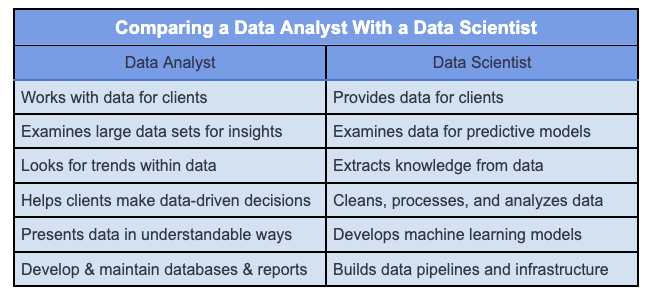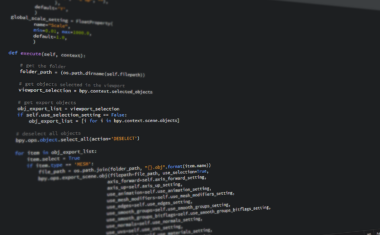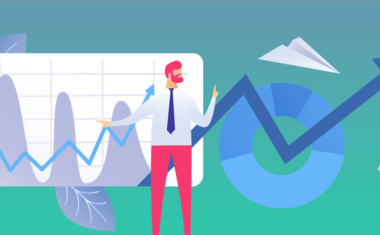The demand for professionals who can analyze, interpret, and draw insights from data is rising, and for those with the aptitude and drive to meet this demand, there are two career paths that stand out: data analyst and data scientist. While the two roles sound similar and may seem interchangeable, they have unique responsibilities and requirements.
In this article, we break down the differences between the two positions, their job role, prerequisites, essential skills, average salary, career goals, and the tools they use. Whether you are considering a career switch or just starting out, this guide can help you make an informed decision.
Table of Contents

Is There a Difference Between a Data Analyst and a Data Scientist?
Yes, there is a difference between a data analyst and a data scientist. A data analyst examines large data sets to uncover actionable insights. In contrast, a data scientist is responsible for collecting, analyzing, and interpreting complex data to create predictive models and make data-driven decisions.
The Discipline
Before diving into the differences between the roles of a data analyst and a data scientist, it is crucial to understand the definitions of their separate areas of expertise.
What Is Data Analytics?
Data analytics involves collecting, cleaning, and analyzing large data sets using various statistical and computational methods to uncover insights and trends within the data. These insights can be used to drive business decisions, solve complex problems, and optimize processes.
What Is Data Science?
The goal of data science is to find patterns and generate insights that can be used to inform decisions and drive business value. It involves using a combination of statistical models, computer science, and expertise to extract insights and knowledge from the data given. Data scientists do this by using artificial intelligence and data mining techniques.
The Role
Understanding the role of a data analyst and a data scientist is essential in determining which career to pursue.
What Does a Data Analyst Do?
In a nutshell, data analysts help businesses make data-driven decisions. They collect, process, and perform statistical analyses on large data sets. They interpret the results and present insights to stakeholders in an easily understandable way and develop and maintain databases, reports, and dashboards.
What Does a Data Scientist Do?
Data scientists leverage their expertise in advanced statistical methods, predictive analytics, and machine learning to drive business growth. They also extract insights from unstructured data and develop algorithms to automate complex processes.
Data Analyst vs. Data Scientist: A Day in the Life
To better understand the key differences between a data analyst and a data scientist, it’s helpful to examine their day-to-day responsibilities, which can vary significantly.
What Does an Average Day Look Like for a Data Analyst?
Data analysts typically spend their days doing the following:
- Collecting, processing, and analyzing data to identify trends and insights.
- Creating visualizations and reports to communicate findings to stakeholders.
- Collaborating with colleagues from different departments to understand business needs and provide data-driven solutions.
They may also maintain databases and monitor key performance indicators to ensure data accuracy and integrity.
What Does an Average Day Look Like for a Data Scientist?
On an average day, a data scientist will be involved with the following:
- Cleaning, processing, and analyzing large datasets.
- Developing and testing advanced machine learning models to refine algorithms used to improve business performance.
- Designing experiments and building data pipelines and infrastructure.
General Prerequisites
To pursue a career in data analytics or data science, certain general prerequisites are necessary to ensure success in these fields.
What Are the Requirements To Become a Data Analyst?
The educational requirements to become a data analyst generally include a strong background in mathematics, statistics, and computer science and proficiency in programming languages such as SQL and Python.
A bachelor’s degree in a related field is no longer required, although most employers appreciate extensive practical experience in data analysis and a strong portfolio.
What Are the Requirements To Become a Data Scientist?
Besides strong technical knowledge, aspiring data scientists need experience working with big data, artificial intelligence, and data mining techniques. Data scientists must also have strong communication skills and a passion for solving complex problems using data-driven approaches.
Essential Skills
If you want to excel as a data analyst or data scientist, there are several common skills that you will need to master.
What Skills Does a Data Analyst Need To Succeed?
Data analysts need a combination of technical and soft skills:
Technical Skills
Here are five technical skills that are essential for data analysts looking to succeed in the field:
- Proficiency in SQL and/or other programming languages
- Advanced Excel skills, including the ability to use pivot tables and VLOOKUP functions
- Experience working with data visualization tools such as Tableau or Power BI
- Understanding of statistical analysis and modeling techniques
- Familiarity with database management systems and project management
Soft Skills
Besides technical skills, data analysts also need these soft skills:
- Excellent communication skills, both written and verbal
- Critical thinking and problem-solving skills
- Attention to detail and the ability to work accurately with large datasets
- Strong organizational skills and the ability to manage time effectively
- Collaboration and teamwork skills to work across departments and with stakeholders
- A passion for learning and an ability to stay up-to-date with emerging technologies and trends in the field
What Skills Does a Data Scientist Need To Succeed?
Here’s the combination of skills that you’ll need to work as a data scientist:
Technical Skills
The technical skills you need to possess as a data scientist include but are not limited to:
- Proficiency in programming languages such as Python, R, and SQL
- Experience with data analysis and visualization tools such as Pandas, Matplotlib, and Seaborn
- Understanding of machine learning and deep learning algorithms and frameworks such as TensorFlow and Keras
- Familiarity with big data technologies such as Hadoop, Spark, and Hive
- Expertise in statistical analysis and modeling techniques
- Knowledge of data cleaning and pre-processing techniques
- Experience with cloud computing platforms such as AWS and Azure
Soft Skills
Successful data scientists should possess the following soft skills:
- Excellent communication skills, including the ability to explain complex concepts to both technical and non-technical stakeholders
- Critical thinking and analytical skills to design practical solutions to complex business problems
- Ability to work collaboratively with cross-functional teams from different backgrounds and domains
- A strong sense of curiosity
Tools
Several specialized tools are available to data analysts and data scientists to help them effectively work with and analyze large datasets.
Tools Used by Data Analysts
Some of the most popular tools data analysts use include statistical software such as R and SAS, programming languages such as Python and SQL, and data visualization tools like Tableau and Power BI.
Excel is also a commonly used tool for data analysis, particularly for smaller datasets.
Tools Used by Data Scientists
Besides using the tools above, data scientists should also be familiar with machine learning frameworks such as TensorFlow and PyTorch. Big data technologies are also commonly used to process and analyze large data sets.
Moreover, data scientists may use cloud computing platforms such as AWS and Azure to store and manipulate data.
Salary
Understanding the earning potential of a career in data analytics or data science can be crucial in choosing the right path.
What Does a Data Analyst Earn?

A data analyst earns an average salary of $65,630 per year.
What Does a Data Scientist Earn?

According to Indeed, data scientists have an annual salary of up to $123,842.
Data Analyst vs. Data Scientist: Career Path
To explore a career in data analytics or data science, it is essential to understand the career opportunities and paths available for each.
What Is a Typical Career Path for a Data Analyst?
A typical career path for a data analyst starts with an entry-level position, such as a data entry clerk or research assistant, before moving on to junior data analyst or business intelligence analyst roles. As they gain experience and expertise, they may progress to senior data analysts or leadership roles, such as data architect or business analyst. Continuing education and skill development are vital for career advancement in this field.
What Is a Typical Career Path for a Data Scientist?
Data scientists begin their careers as research assistants or junior data scientists. More advanced roles include data scientists and senior data scientists. With more experience under their belt, they develop specialized skills in areas such as big data and machine learning, being able to take on roles as machine learning engineers or directors of data science.
Which Is the Right Career for Me?
With so many overlapping skills and responsibilities between the two fields, it can be challenging to determine whether a career as a data analyst or a data scientist is the right fit for you. Here’s what to take into consideration.
Becoming a Data Analyst Is for You if:
You enjoy working with data, have strong attention to detail, possess excellent problem-solving and analytical skills, and have at least a basic understanding of programming languages and statistical analysis techniques.
Becoming a Data Scientist Is for You if:
You are passionate about uncovering insights from data, possess core skills in programming, statistics, and machine learning, and are excited about developing innovative solutions to complex business problems.
Get To Know Other Data Science Students
Corey Wade
Founder And Director at Berkeley Coding Academy
Leoman Momoh
Senior Data Engineer at Enterprise Products
Rane Najera-Wynne
Data Steward/data Analyst at BRIDGE
Becoming a Data Professional
Here are a few ways to break into the exciting field of data.
Where To Start
Getting started can be daunting for individuals interested in pursuing a career in business analytics or data science, but several key steps can help guide your journey.
How To Become a Data Analyst
To become an experienced data analyst, you need to either earn a related degree—computer science, statistics, or mathematics are all common choices—or complete a data analytics bootcamp. Gaining experience through internships or working on personal projects is also valuable in building in-demand skills and developing a portfolio.
Make sure to develop proficiency in programming languages such as SQL, Python, and R, as well as in data visualization tools like Tableau or Power BI, and maintain an ongoing commitment to continuing education and professional development.
How To Become a Data Scientist
As a data scientist, you typically need to have completed an advanced degree in a relevant field—such as computer science, math, or statistics—or a data science bootcamp.
Building a portfolio of personal projects, networking with other data professionals, and finding a mentor in the field can also be valuable in developing expertise and finding job opportunities.
Real-Life Examples To Inspire You
To better understand what it takes to succeed as a data analyst or data scientist, it can be helpful to learn from real-life examples of those who have achieved success.
Becoming a Data Analyst
In this YouTube video, Stefanovic covers the journey of becoming a data analyst without a related degree and shares the necessary skills and tools required to get started as a data analyst. The video also explains how to get a data analyst job by providing valuable LinkedIn outreach tips, showing you the hurdles of navigating the job search when you’re not backed by a solid educational background.
Becoming a Data Scientist
In this article, Zita shares his journey of becoming a self-taught experienced data scientist without any formal education or experience. He took over 30 online courses, participated in hackathons, worked on personal projects, and gained experience through side projects with companies.
After a year of learning, Zita landed their first big data position and is now a data scientist for an international consulting firm. The article aims to inspire and encourage those interested in data science to pursue their passion, highlighting that formal education isn’t always necessary to become a data scientist.
Data Analyst vs. Data Scientist FAQs
We’ve got the answers to your most frequently asked questions.
Is It Easier To Become a Data Analyst or a Data Scientist?
It depends on your background, skills, and education. If you have a strong foundation in statistics and programming, it may be easier to become a data scientist. However, if you have a strong foundation in business and communication, it may be easier to become a data analyst. However, both roles require continuous learning and development, which ultimately depends on your willingness to learn and adapt to new technologies and methods.
Which Is More in Demand: Being a Data Analyst or a Data Scientist?
Data analysts are currently more in demand because there is a growing need for professionals who can analyze and interpret data to make informed business decisions. However, both roles are important in data analytics, and the demand for both is expected to grow in the coming years.
Are Data Analyst and Data Scientist Roles Stressful?
Like any job, the roles of a data analyst and data scientist can sometimes be stressful. Both positions involve working with large amounts of data, meeting deadlines, and communicating insights to stakeholders. There can be pressure to deliver accurate and meaningful insights while working with limited resources.
Besides the challenges, many people find the work rewarding and enjoy the challenge of solving complex data problems.
Can I Make a Switch From Being a Data Analyst to Being a Data Scientist?
The switch from data analyst to data scientist might require additional education, training, and experience. Data scientists typically have a more advanced skill set, including expertise in statistical analysis, machine learning, and programming languages.
If you are interested in making the switch, you may need to take additional data science courses or earn a degree in a related field, such as computer science, statistics, or data science. You may also want to gain experience working on projects that involve advanced analytical techniques.
Since you’re here…
Curious about a career in data science? Experiment with our free data science learning path, or join our Data Science Bootcamp, where you’ll get your tuition back if you don’t land a job after graduating. We’re confident because our courses work – check out our student success stories to get inspired.







